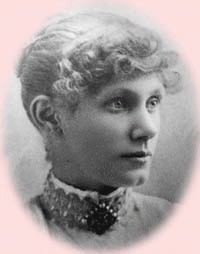Sarah Herring Sorin
Women’s Plaza of Honor
Women Lawyers ~ Women Leaders Arch
Sarah Inslee Herring became Arizona’s first woman lawyer on November 21, 1892, in Tombstone.
She was born January 15, 1861, in New York City, to William Herring and Mary Inslee Herring. She taught grammar school in Westchester County, New York, for three years before migrating with her family to Arizona Territory. She taught school in Tombstone for several years, and also served as the first female Principal (1884-1886, spring 1889) and librarian (1891). When her brother, her father’s law partner, died suddenly, Sarah resigned from teaching to become a lawyer and to take his place in the family firm.
After a year’s apprenticeship with her father, Sarah passed a rigorous oral exam conducted by three attorneys on November 19, 1892. On November 21st, she received her certificate to practice in Tombstone’s First Judicial District Court. Seven weeks later, on January 12, 1893, she signed her name upon the Arizona Supreme Court’s Roll of Attorneys. That fall, she interrupted her beginning mining law practice to attend New York University Law School, and graduated with honors in 1894.
In 1896, The Herring family and law firm moved to Tucson, the largest town in the Territory. Two years later, on July 21, 1898, Sarah married Thomas Robertson Sorin, a rancher, mining enthusiast, and former newspaperman. Sarah continued to practice, dividing her residence between Tucson and the Sorin’s Dragoon Mountains ranch in Cochise County. She eventually spent most of her time in Tucson, and later in Globe.
Sarah was an outstanding litigator, winning “golden opinions” from even opposing lawyers for her courtroom prowess. A lawyer of impressive ability and highly intelligent, she earned the respect of judge and jury, and admiration of the bar. She excelled in legal reasoning and strategy, and drafted winning briefs with her research and persuasive writing. She and her father handled a variety of legal issues, including: workplace injuries, lawful timber cutting for mining companies, mining patents, title disputes, mines taxation, and a mining strike. William expertly took on all the criminal cases and divorce actions, as Sarah handled more corporate work.
Sarah and William had several appeals at the Arizona Supreme Court, and a few to the United States Supreme Court. On April 16, 1906, Sarah Herring Sorin was the 24th woman lawyer, and the first from Arizona, admitted to practice before the nation's highest court. On November 6, 1913, she made legal history at the court as the first woman to argue a case solo, without accompanying male counsel. The Supreme Court decided in her favor for the mining company in Work v United Globe Mines. Five months later, on April 30, 1914, at the height of her legal career, Sarah died from pneumonia in Globe.
Sarah liked to say she stood for what was “right and good.” She was not a political activist, or supporter of woman suffrage. However, she effected change through the courts and the profession. As a “first woman” trailblazer, she was a woman of personal and symbolic strength, one who mentored a new woman lawyer. She inspired many women who followed her. Arizona Woman Lawyers Association annually honors a current woman lawyer in her name.



